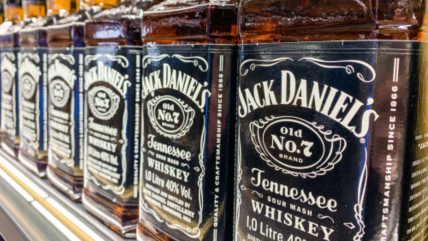
Brown-Forman expects the US spirits market to “get back to the norm of 4% to 5%” growth from its new fiscal year.
The category has seen sales come under pressure from weaker consumer spending and heavy distributor inventories built during the Covid-19 pandemic.

Discover B2B Marketing That Performs
Combine business intelligence and editorial excellence to reach engaged professionals across 36 leading media platforms.
Speaking to analysts after Brown-Forman reported its third-quarter results yesterday (6 March) CEO Lawson Whiting said the company “does believe next [fiscal] year will start to return to those normal levels as this inventory conversation… we think will largely be over”.
When asked how the group expects “consumer pantry destocking” to affect the US spirits category, Whitman said: “This is not like food or some other categories that move much faster. Spirits, I call it kind of in the middle.”
He added: “Eighty per cent of our consumer base only buys two bottles a year. So, they have a bottle sitting in their cabinet at home that’s probably half full and it’s just the deferred cost…. The good thing is, we think that if you do the math around that, that should largely be over… we expect going forward, particularly in the US I think we’re talking, but our sales rates to be much closer to what consumer takeaway is right now.”
His comments accompanied the group’s cut to targets for annual organic net sales and organic operating income yesterday (6 March) amid what it called a “challenging operating environment”.

US Tariffs are shifting - will you react or anticipate?
Don’t let policy changes catch you off guard. Stay proactive with real-time data and expert analysis.
By GlobalDataThe company forecast organic sales growth of 3-5%, a drop on its 5-7% prediction made last December.
Brown-Forman also said it expected organic operating income growth of 2% year on year at best, or flat growth at worst.
The guidance shift followed the release of its results for the nine months and third quarter to the end of January.
In the nine-month period, Brown-Forman saw net sales were increase 1% at $3.21bn. Sales slipped 1% in the third quarter to $1.07bn.
The group said the growth it saw in its “emerging” markets and in travel retail in the nine months was partially offset by lower sales in the US and its “developed international” territories.
Whisk(e)y net sales fell 2% – and by 1% on organic basis – amid lower volumes for Jack Daniel’s Tennessee Whiskey and Jack Daniel’s Tennessee Honey. Brown-Forman said its whisk(e)y portfolio had lapped “strong results” from the previous year.
The sales of the company’s New Mix RTD rose 17% organically. Net sales from Tequila were down 3% on an organic basis.
Nine-month operating income was up 25% to $1.04bn, helped by higher gross margins, the impact of M&A – including the gain on the sale of Finlandia – and the absence of last year’s impairment on the vodka brand. On an organic basis, operating income increased 2%.
Net income was 32% higher at $758m.
The performance RTDs was the main driver of growth in the US spirits market, Whitman told analysts. “You take those out and it’s closer to flat,” he said.
“It’s been 30-plus years since TDS [total distilled spirits] has gone negative in the United States, not since the early 1990s when they had the excise tax changes. So, from a pure TDS takeaway US figure, it’s about as bad as it’s been, well, it is as bad as it’s been in my career. There are certainly challenges there.”
Commenting on the prospects of RTDs, Whitman described the category as “a volatile space for sure”. He added Brown-Forman had already seen several “booms and busts” in the category, citing the California Cooler ready-to-drink sangria it acquired in the 1980s, which “went from 12 million cases to zero in about two years”.
The company’s management was also asked whether the growth of RTDs could affect future volume growth, given less liquid is sold in the product compared to a full bottle of spirits. Responding to the query, CFO Leanne Cunningham said: “We will be planning to supply liquid to significantly broader geographic reach with this product.”





